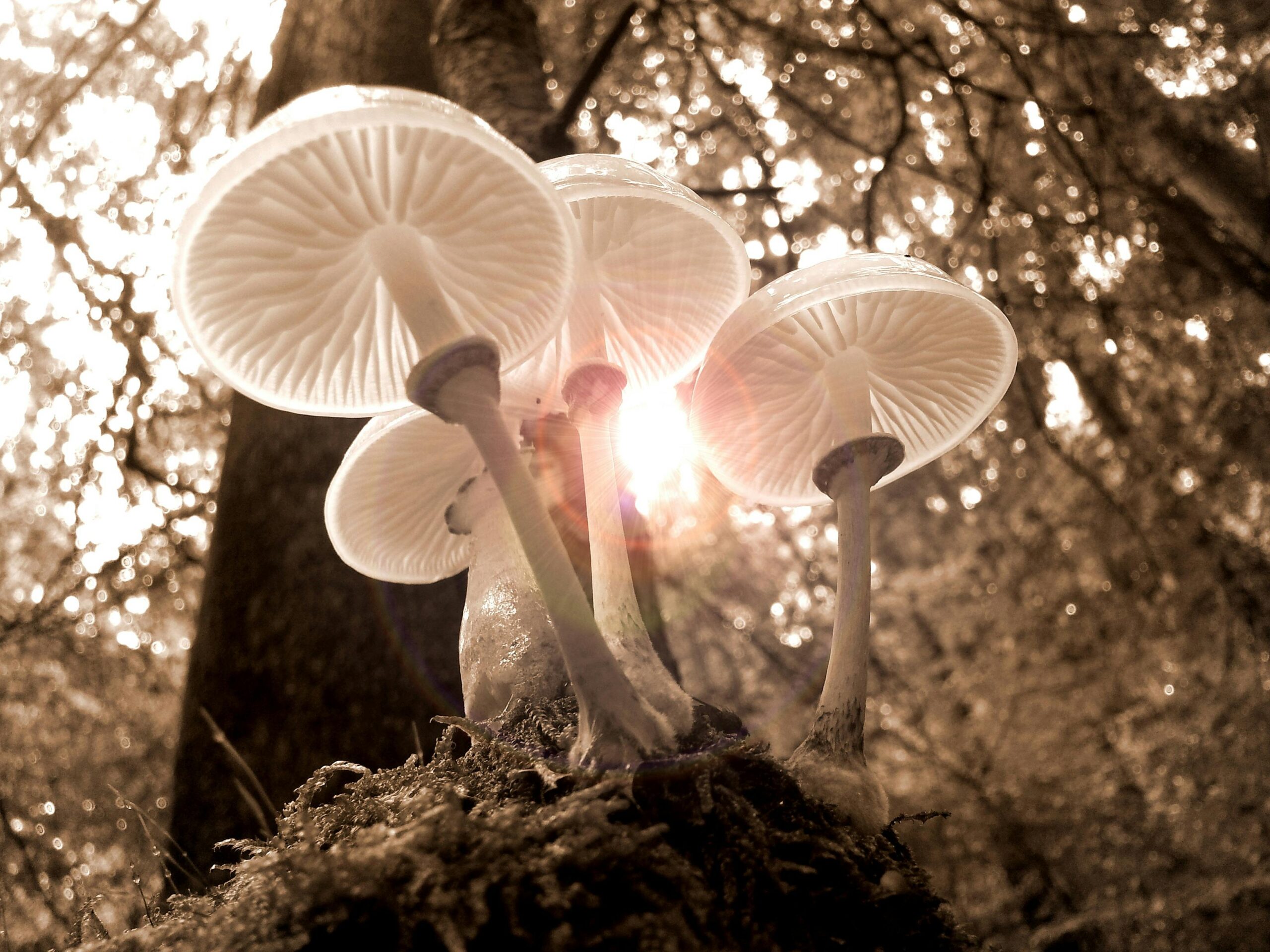Have you ever considered trying shrooms, which are often referred to as magic mushrooms? There is a wide range of reasons why people consume mushrooms. While some desire to alter their vision of reality or experience bliss, some people wish to increase their creative potential more than anything else. In addition, mushrooms are ingested for spiritual purposes, with the intention of bringing someone closer to their deity or assisting them in engaging in contemplation. In addition, contemporary research is looking into the possibility of using them to treat post-traumatic stress disorder (PTSD), depression, and anxiety. Allow me to explain what mushrooms are and how they should be used in a responsible manner.
What Are Shrooms?
The United States of America, Central America, and Mexico are the natural habitats for the growth of psilocybe mushrooms, such as mushrooms. They are considered hallucinogens due to the presence of psilocybin and psilocin in their composition. Over two hundred different species of these mushrooms can be distinguished from one another by their long stems and crowns that are brown or tan in color and have black ridges underneath them. Consuming them or brewing them into tea is a typical practice, and the benefits can linger for three to six hours.
Onset of Effects
In most cases, the effects of mushrooms start to manifest thirty minutes after eating. If, on the other hand, the substance is brewed into tea or steeped in lemon juice, the effects can begin as early as fifteen minutes, particularly when consumed on an empty stomach. It is possible that users will experience exhilaration and see colors more brightly at first.
Peak Experience
Within the first sixty to ninety minutes, users may experience a peak of effects, which may include feelings of euphoria, tranquility, or a spiritual awakening. Users may experience depersonalization or derealization, which can last anywhere from three to six hours, and objects may give the impression that they are breathing.
Come Down
The effects progressively decrease once the peak has occurred. It is possible for users to have headaches, exhaustion, and a rise in either anxiety or sadness.
After-Effects
Flashbacks can happen even years after the effects of the substance have worn off, and they are frequently brought on by factors such as stress, tiredness, or drug use. In most cases, these are only a few minutes long.
Factors Influencing Duration and Intensity
The experience is influenced by a number of factor:
-
Dosage: Higher doses lead to more intense effects.
-
Metabolism & Body Weight: Faster metabolisms and lower body weight can intensify effects.
-
Substance Interaction: Other drugs or alcohol can alter effects unpredictably.
-
Mental & Emotional State: Anxiety or fear can affect the experience.
-
Company: The mood and presence of others can influence the trip.
-
Tolerance: Frequent use can build tolerance.
Increasing the Product’s Shelf Life
Shrooms, like any other food, have a shelf life. Until they are used, make sure they are dry. Dry them out for extended storage, or store them in a brown paper bag in the refrigerator for five to seven days without washing them. Although the effectiveness of mushrooms declines over time, they can be stored for up to nine months if they are properly frozen.
Do Shrooms Go Bad
When mushrooms become spoiled, they may change color, become slimy, develop mold, or smell unpleasant. Steer clear of them if you want to avoid getting food illness.
Considerations Regarding Dangers and Safety
Shrooms can create negative trips, which can lead to worry or paranoia, despite the fact that many of the experiences are positive. It is possible that prolonged usage will affect the chemical composition of the brain, and some people may develop Hallucinogen Persistent Perception Disorder (HPPD), which is characterized by persistent flashbacks.
Set and Setting
In order to have a great experience, it is essential to have a peaceful mindset and atmosphere. An unpleasant travel may be the result of stressful circumstances or worried sentiments.
Psychedelic Shrooms
Psychedelic shrooms, commonly known as magic mushrooms, are naturally occurring fungi that contain the psychoactive compounds psilocybin and psilocin. These substances are known for their ability to induce altered states of consciousness, leading to vivid visual and auditory hallucinations, changes in perception, and a sense of euphoria. Often consumed for spiritual, recreational, or therapeutic purposes, shrooms have been used in various cultural rituals for centuries. Recent research is exploring their potential benefits in treating mental health conditions such as depression, anxiety, and PTSD. Despite their promising therapeutic prospects, it’s essential to approach their use with caution due to the potential for unpredictable effects and their legal status in many regions.
Combining with Other Substances
Avoid combining mushrooms with other substances because doing so raises the likelihood of experiencing a negative experience.
Legal Implications
In the United States, mushrooms are classified as a Schedule 1 substance, which indicates that they have a high potential for abuse and no known medical application. However, under specific circumstances, they have been legalized in a number of municipalities and states. Despite the fact that research is still being conducted, they are not yet licensed for therapeutic usage in Canada. Worldwide, legality might vary greatly.
Final Thoughts
Make sure you are well-informed and responsible if you are thinking about using mushrooms. Do not mix medications with other substances and be sure to check for any potential interactions. Those who are looking for treatment for addiction can receive assistance for alcohol, drugs, and opioids from our organization. Feel free to get in touch with us.
Dr. Mitchell G. Cohen is a board-certified Internal Medicine specialist with over 34 years of experience in patient-centered healthcare. A graduate of Hahnemann University School of Medicine, Dr. Cohen completed his internship at the University Health Center of Pittsburgh, where he gained invaluable hands-on experience. He is also a certified addiction specialist, holding membership with the American Society of Addiction Medicine (ASAM).
Currently based in Nashua, NH, Dr. Cohen is affiliated with Saint Joseph Hospital, where he provides comprehensive care focusing on both internal medicine and addiction treatment. His expertise includes prevention, diagnosis, and management of adult diseases, as well as specialized care for individuals facing substance use disorders.
Dr. Cohen is committed to fostering open communication, ensuring his patients are fully informed and empowered to make confident decisions about their health and treatment options.

MD Mitchell Grant Cohen
Dr. Mitchell G. Cohen is a board-certified Internal Medicine specialist with over 34 years of experience in patient-centered healthcare. A graduate of Hahnemann University School of Medicine, Dr. Cohen completed his internship at the University Health Center of Pittsburgh, where he gained invaluable hands-on experience. He is also a certified addiction specialist, holding membership with the American Society of Addiction Medicine (ASAM).
Currently based in Nashua, NH, Dr. Cohen is affiliated with Saint Joseph Hospital, where he provides comprehensive care focusing on both internal medicine and addiction treatment. His expertise includes prevention, diagnosis, and management of adult diseases, as well as specialized care for individuals facing substance use disorders.
Dr. Cohen is committed to fostering open communication, ensuring his patients are fully informed and empowered to make confident decisions about their health and treatment options.
- MD Mitchell Grant Cohen
- MD Mitchell Grant Cohen
- MD Mitchell Grant Cohen
- MD Mitchell Grant Cohen
- MD Mitchell Grant Cohen
- MD Mitchell Grant Cohen
- MD Mitchell Grant Cohen
- MD Mitchell Grant Cohen
- MD Mitchell Grant Cohen
- MD Mitchell Grant Cohen
- MD Mitchell Grant Cohen
- MD Mitchell Grant Cohen
- MD Mitchell Grant Cohen
- MD Mitchell Grant Cohen
- MD Mitchell Grant Cohen
- MD Mitchell Grant Cohen
- MD Mitchell Grant Cohen
- MD Mitchell Grant Cohen
- MD Mitchell Grant Cohen
- MD Mitchell Grant Cohen
- MD Mitchell Grant Cohen
- MD Mitchell Grant Cohen
- MD Mitchell Grant Cohen
- MD Mitchell Grant Cohen
- MD Mitchell Grant Cohen
- MD Mitchell Grant Cohen
- MD Mitchell Grant Cohen
- MD Mitchell Grant Cohen
- MD Mitchell Grant Cohen
- MD Mitchell Grant Cohen
- MD Mitchell Grant Cohen
- MD Mitchell Grant Cohen
- MD Mitchell Grant Cohen
- MD Mitchell Grant Cohen
- MD Mitchell Grant Cohen
- MD Mitchell Grant Cohen
- MD Mitchell Grant Cohen
- MD Mitchell Grant Cohen
- MD Mitchell Grant Cohen
- MD Mitchell Grant Cohen
- MD Mitchell Grant Cohen
- MD Mitchell Grant Cohen
- MD Mitchell Grant Cohen
- MD Mitchell Grant Cohen
- MD Mitchell Grant Cohen
- MD Mitchell Grant Cohen
- MD Mitchell Grant Cohen
- MD Mitchell Grant Cohen
- MD Mitchell Grant Cohen
- MD Mitchell Grant Cohen
- MD Mitchell Grant Cohen
- MD Mitchell Grant Cohen
- MD Mitchell Grant Cohen
- MD Mitchell Grant Cohen
- MD Mitchell Grant Cohen
- MD Mitchell Grant Cohen
- MD Mitchell Grant Cohen
- MD Mitchell Grant Cohen
- MD Mitchell Grant Cohen
- MD Mitchell Grant Cohen
- MD Mitchell Grant Cohen
- MD Mitchell Grant Cohen
- MD Mitchell Grant Cohen
- MD Mitchell Grant Cohen
- MD Mitchell Grant Cohen
- MD Mitchell Grant Cohen
- MD Mitchell Grant Cohen
- MD Mitchell Grant Cohen
- MD Mitchell Grant Cohen
- MD Mitchell Grant Cohen
- MD Mitchell Grant Cohen
- MD Mitchell Grant Cohen
- MD Mitchell Grant Cohen
- MD Mitchell Grant Cohen
- MD Mitchell Grant Cohen
- MD Mitchell Grant Cohen
- MD Mitchell Grant Cohen
- MD Mitchell Grant Cohen
- MD Mitchell Grant Cohen







